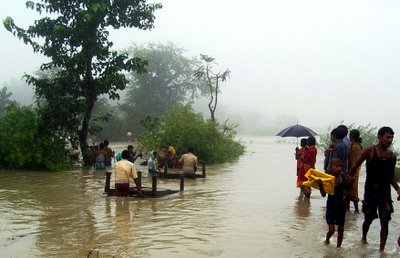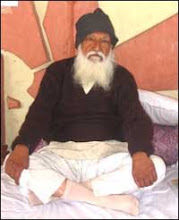People and Organisations
Resources: Water & sanitation for the flood affected
Posted on 13 Sep, 2008 09:43 PMParineeta Dandekar spent some time to find resources on the web for people involved in relief efforts in flood situations.The following provides a concise look at precautions, useful resources and general tips regarding drinking water, sanitation, relief measures in the flood affected regions. Water and Sanitation during floods: Some resources for relief workers and flood affected population With more than 300,000 people in relief camps and two mega relief camps planned in Bihar, consideration of issues related to water and sanitation is urgent. Epidemics and water borne diseases can spread rapidly and easily in the present situation.The information below is collected from various sources and aims to help of flood affected population, people in relief camps, volunteers, relief workers working in Bihar. Relief and aid workers should take the necessary precautions to assure their health and safety while working on rescue and clean up procedures. While conducting rescue and clean up operations, it should be assumed that the all surfaces have been contaminated with disease-causing organisms. This important assumption must be considered in decisions involving personal safety of rescue and cleanup personnel . ( for more information, please see here) Personal Protection Measures ( For more information, please see here)
Download the resource document as a doc file: Water & Sanitation for the Flood Affected
Locations of relief camps in flood affected areas of Bihar: Guidelines and contact details
Posted on 11 Sep, 2008 11:03 PMTwo documents giving the details of the mega camps and other relief camps that are being run by the Government. Thanks to Eklavya Prasad of Megh Pyne Abhiyan for forwarding these documents.
Offer of water filters by Institute of Minerals and Materials Technology, Bhubaneswar
Posted on 11 Sep, 2008 03:06 AMPlease see message below: ======= We are in process of distributing 1,000 sets of TERAFIL water filters among the victims of Bihar flood affected areas for supply of drinking water. These filters can provide at least 50,000 litres of clean drinking water every day, which can be operated without electricity by the victims easily, like any other candle filters.
Organisations accepting donations at the wake of the Bihar floods, 2008
Posted on 04 Sep, 2008 08:46 AM
Courtesy: biharfloodrelief2008.blogspot.com
Water saver faucet with measured out-flow arrangement
Posted on 26 Jun, 2008 11:01 PM Fresh water to-day has become a precious commodity world wide. Water-saving, better utilization of water and avoiding wastage is becoming a universal concern. This New faucet, avoids inadvertent wastage during the usage of water for legitimate purpose such as washing of hands. It is user friendly, Hygienic, Economical, Eliminates leaking taps, Made of recyclable material, and helps in the optimum use of water. One of the basic problems with the commonly used screw-type faucet is that once the faucet is open to wet the hands, while the soap is being applied fresh water is continuously flowing down the drain without serving any purpose. As the time taken for applying soap constitutes more than 60% of the time in a normal hand washing cycle it can be easily understood that a large quantity of water is going to waste inadvertently. Apart from this screw-type faucet can continuously waste water if they are left open due to carelessness etc.
Fresh water to-day has become a precious commodity world wide. Water-saving, better utilization of water and avoiding wastage is becoming a universal concern. This New faucet, avoids inadvertent wastage during the usage of water for legitimate purpose such as washing of hands. It is user friendly, Hygienic, Economical, Eliminates leaking taps, Made of recyclable material, and helps in the optimum use of water. One of the basic problems with the commonly used screw-type faucet is that once the faucet is open to wet the hands, while the soap is being applied fresh water is continuously flowing down the drain without serving any purpose. As the time taken for applying soap constitutes more than 60% of the time in a normal hand washing cycle it can be easily understood that a large quantity of water is going to waste inadvertently. Apart from this screw-type faucet can continuously waste water if they are left open due to carelessness etc.
Hydrophobic sand by DIME
Posted on 16 Jun, 2008 10:47 AMDesalt Innovation Middle East LLC (DIME) has introduced hydrophobic sand or "water proofed" sand. DIME has exclusive rights from a chemical manufacturer in Germany to produce the sand, by the addition of an additive SP-HFS 1609 by a specially developed mixer.
Information required on the water testing resources in India
Posted on 21 May, 2008 09:29 AMAs the quality of our water deteriorates, we expect that people will more and more need to/want to test the quality of their drinking and other water.
The list below represents a compilation of information on water testing resources in various parts of India. The list uploaded here has been prepared from the information collected and compiled by NEERI, Nagpur and AIIH & PH, Kolkata with the professional support of a senior consultant and in collaboration with WHO India Country Office, New Delhi.

Invitation for joining URAN PSI group
Posted on 18 May, 2008 10:48 PMSeveral threats have emerged in recent years to the pristine Himalayan rivers of Uttarakhand. These include: (i) the proposed construction of 220 dams (ii) the drying up of rain fed rivers due to deforestation and deforestation of their catchments (iii) release of untreated sewage from river side towns and habitations and (iv) illegal sand mining of river beds.
Prof.G. D. Agrawal's satyagraha against the construction of dams on the Bhagirathi River
Posted on 17 May, 2008 09:08 AM
Pained by the unrelenting destruction of the Ganga river, especially by a series of dams in its upper reaches, Dr G.D. Agrawal, India's pre-eminent environmental quality scientist and a legendary Professor (and HoD) of Civil & Environmental Engineering at IIT-Kanpur. (Access:Biography Sketch Here) has decided to go on a fast-unto-death to oppose its continuing desecration. His conviction that we are staring at an unprecedented ecological and cultural catastrophe comes from his powerfully logical mind. Critique on proposed dams on Bhagirathi River. Access here: Critique on Dams
Electro Arsenic Purifier developed by CECRI, Karaikudi
Posted on 25 Apr, 2008 05:32 PMThe Central Electrochemical Research Institute (CECRI), Karaikudi, India with the sponsorship of Department of Science and Technology (DST), New Delhi, India has developed an indigenous, low cost method of removing Arsenic from drinking water. The purifier is eco-friendly and can be run off a solar power source. Models for Domestic as well as Community use have been developed